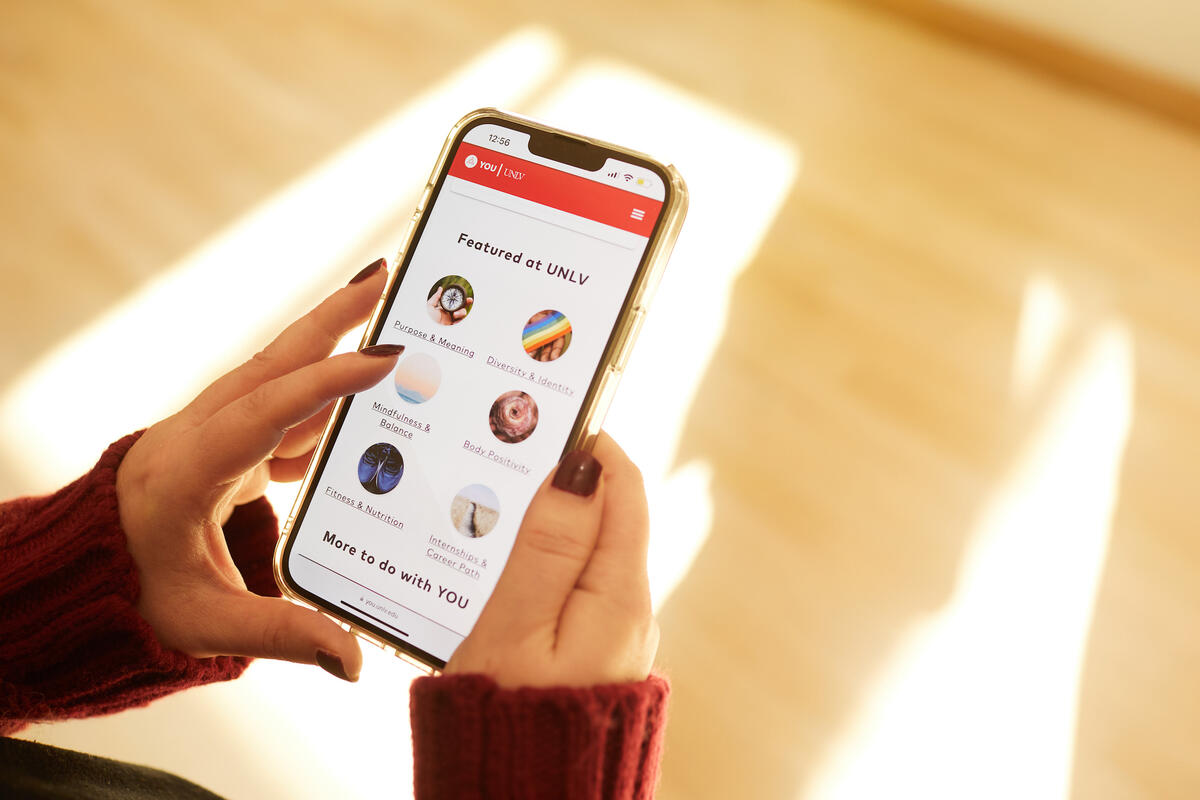On a campus as large as UNLV, it can feel overwhelming to figure out the right office or person to tap into for help — particularly when you’re already dealing with a stressful situation.
That’s where YOU @ UNLV comes in. The app, which is available to students, faculty, and staff, works a lot like your average TV streaming device by conveniently centralizing all of UNLV's wellness resources in one place. Sharon Jalene, associate dean of academic and student affairs in the School of Integrated Health Sciences, helped champion getting the platform launched at UNLV.
“It’s the wayfinder for students and employees to find the resources they need,” says Jalene. “It’s not trying to duplicate, replicate, or take over other resources. It helps centralize all of UNLV’s [mental health] resources and provides additional support for things we’ve yet to develop.”
The YOU at College app was originally developed through a public-private partnership between Grit Digital Health and Colorado State University. The School of Integrated Health Sciences has been piloting the initiative in partnership with Student Counseling and Psychological Services (CAPS).
Jalene, who initially applied for a grant to pay for the application’s subscription fee, reached out to associate vice president for Student Wellness Jamie Davidson and CAPS director Shauna Landis for assistance with funding over the next three years. One dollar of the $50 special fee students pay per semester toward CAPS goes to YOU @ UNLV.
“The app focuses on holistic care,” explains Trey Curtis-Brown, a graduate assistant for the School of Integrated Health Sciences as well as the YOU @ UNLV app student ambassador. “Everything from your grades and academics to your mental and physical health to your personality, purpose, and meaning here on campus.”
Curtis-Brown, who graduates this May, says he participated in the initial development, data collection, and launch of YOU @ UNLV and continues to work on the back-end data collection. He’s also been tasked with the important responsibility of promoting the app to the student body in an effort to increase its adoption rate.
“Right now, we are just over the 5% mark of the university, so around 3,700 students, faculty, and staff have already utilized the app,” says Curtis-Brown Our goals are to get up to 15% by the start of next semester, which I think we’ll be able to do.”
The app, which keeps users completely anonymous, gathers statistical data based on demographics listed in profiles or what resources are most utilized. This way, the app can provide users with a more personalized experience. Such analytics can also let campus administrators know what further resources can be added to better serve students.
So, how does it work?
“We redirect people from anywhere on campus throughout the app. We have 450 different websites at the university, so we have integrated every single one of those websites into the You @ UNLV app. As you’re going through the append you say, ‘Hey, I need a counseling appointment,’ so you can type in UNLV counseling on the app, and it’s going to redirect you to the CAPS’ web page, where you can schedule your appointment.”
In fact, after a recent analytics meeting, the developers noted that 20% of students who used CAPS' services had been redirected there by the YOU @ UNLV app.
“YOU @ College provides 3000 other evidenced-based resources. So, for example, if someone is researching financial wellness, they can look in the app and find resources, set smart goals, and get follow ups. It not only brings all of our campus resources together in one student-friendly app — and also for faculty and staff now — it includes a database of resources that we don’t have the finances or personnel to recreate.”
Once users log into YOU @ UNLV, they are encouraged to fill out their profile (again, it’s all anonymous, but if students, staff, or faculty note they identify, for example, as Black and LGBTQIA+, the app can redirect them to more individualized resources). They can also use three self-check assessment quizzes labeled: Succeed, Thrive, Matter. After taking the assessments, the app will gently highlight and explain various areas of the user’s mental or physical health that may require them to seek further support, resources, or information.
“There are many unique stressors and transition issues that our students face while attending college,” says Nathan Slife, the First- and Second-Year Seminar coordinator in the College of Education. “Especially if they are the first in their families to go to college. Mental health resources like CAPS, UNLV PRACTICE, and YOU @ UNLV are an enormous support for our students, whether they are away from home for the first time and living in campus housing, or working through college-specific stressors that can be helpful to talk through with therapists familiar with a college and university setting.”
For Jalene, the next step in the initiative is to ensure advocacy for it spreads well beyond herself and Curtis-Brown. She hopes to see the app continue to gain support and become ingrained in departments throughout the university.
“When I look at other institutions, there are over 200 that have adopted YOU @ College, including the entire California state system — they have a 96% adoption rate because it’s embedded in their Student Affairs,” says Jalene. “So when students register for class, they also get their [YOU @] account set up. That’s the way we’re going to have to make this work. We need to find ways to embed this centrally as opposed.”



